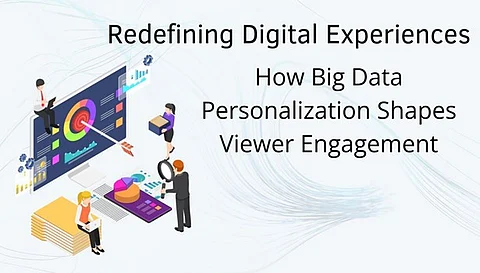

In today’s digital landscape, personalized content is revolutionizing viewer engagement by creating uniquely tailored experiences. Data analytics expert Ramalingeshwar Sirigade examines how Big Data technologies drive scalable personalization in digital content delivery. These innovations enhance user experience and address critical challenges in data management, enabling platforms to deliver relevant, engaging content while maintaining efficient operations and robust data privacy standards.
Big Data has revolutionized content delivery by enabling digital platforms to offer customized experiences to millions of users. Through advanced data analytics and machine learning, these platforms analyze vast amounts of viewer behavior data, identifying patterns and preferences to generate tailored recommendations. This approach creates a seamless experience, allowing users to access content that aligns with their tastes without extensive searching. By consistently delivering relevant and engaging content, platforms not only boost user satisfaction but also enhance engagement and loyalty, as users return for a personalized viewing experience.
Predictive analytics is essential for anticipating user preferences and offering personalized recommendations in real time. By analyzing historical data on viewing patterns, platforms can identify trends and predict the content that will most likely appeal to individual users. This forward-looking strategy personalizes the viewing experience, making it smoother and more intuitive. By aligning recommendations with users' tastes and habits, platforms can foster stronger user loyalty, as viewers are more likely to continue engaging with services that anticipate their interests and make discovery effortless, thereby improving overall satisfaction and retention rates.
Machine learning algorithms power content personalization by dynamically adapting to each user’s evolving preferences. These algorithms analyze real-time interactions, continuously fine-tuning recommendations to ensure relevance. As users engage with specific types of content, the system learns from their behaviors and preferences, building a personalized profile over time. This adaptability allows platforms to provide consistently engaging and tailored suggestions, enhancing the user experience. By delivering content that aligns closely with users' interests, machine learning-driven recommendations keep viewers engaged and encourage longer, more satisfying interactions with the platform.
Personalizing content at scale significantly enhances viewer satisfaction but poses technical challenges. Processing vast volumes of data in real-time demands powerful infrastructure and advanced computing capabilities. Platforms must carefully balance the delivery of timely recommendations with efficient resource management to prevent system slowdowns. Achieving this balance ensures that personalized services remain responsive, offering seamless and engaging user experiences for millions.
Collecting and analyzing user data for personalized content raises privacy concerns, as platforms need access to personal information. Ensuring data protection without compromising personalization quality is crucial. By adopting measures like data anonymization and secure storage, platforms can safeguard user privacy while providing relevant recommendations. Striking this balance fosters trust and encourages users to engage more fully with personalized services, enhancing both user experience and platform credibility.
Real-time data processing enables digital platforms to deliver content recommendations at the moment users are most likely to engage with them. Platforms use real-time analytics to gather insights into ongoing viewer interactions, providing up-to-date recommendations based on current viewing trends. This immediate response to user behavior creates a dynamic and fluid viewing experience, where content suggestions adapt instantly to viewer preferences.
Personalized content strengthens user loyalty by creating an individualized experience that resonates with each viewer. By continuously delivering content that aligns with personal tastes, platforms can foster long-term engagement, turning one-time visitors into loyal users. Personalized recommendations keep users coming back, as they trust the platform to consistently provide enjoyable and relevant content tailored to their preferences.
In conclusion, Ramalingeshwar Sirigade emphasizes the transformative role of Big Data technologies in shaping personalized digital experiences. These innovations allow platforms to deliver content that feels uniquely tailored to each user, enhancing engagement and satisfaction. However, as personalization advances, maintaining a balance between data-driven customization and privacy remains essential. With thoughtful implementation, personalized content has the potential to redefine digital interactions, fostering deeper connections between viewers and platforms in an ever-evolving digital landscape.
